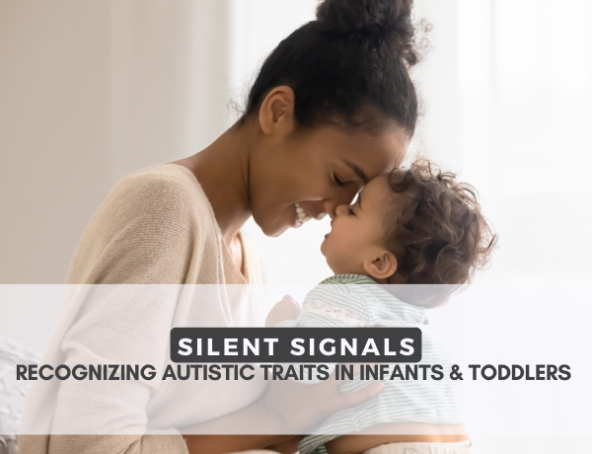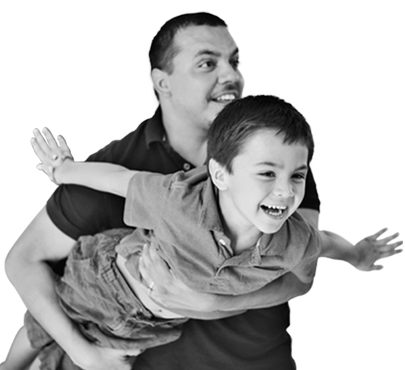Silent Signals: Recognizing Autistic Traits in Infants and Toddlers

As parents, we all want the best for our children. We watch them grow, learn, and explore the world around them with wonder. But what if there are signs that something isn't quite right? Recognizing autistic traits in infants and toddlers is crucial for early intervention and support. In this blog, we will explore why early detection matters and what signs to look for in your little one.
Understanding Autistic Traits:
Autistic traits are associated with early signs or behaviors that may indicate a risk for Autism Spectrum Disorder (ASD). Understanding these signs is the first step towards helping your child thrive.
Common Autistic Traits in Infants:
- Limited Eye Contact: Watch out for infrequent or lack of eye contact during interactions. If your baby consistently avoids making eye contact during playtime or feeding, it could be a sign.
- Lack of Social Smiling: Pay attention to minimal or absent social smiles in response to caregivers. If your baby does not smile back when smiled at, especially by 3 months, it is worth noting to your pediatrician.
- Limited Facial Expressions: Notice minimal or inconsistent changes in facial expressions. For example, if your baby does not look startled by loud noises but seems scared when you talk to them, it might be a sign.
- Delayed or Absent Babbling: Keep an ear out for limited vocalizations or delayed babbling. If your baby isn't cooing, babbling, or making vowel sounds by six months, it could be cause for concern.
Common Autistic Traits in Toddlers (1-2 years):
- Delayed Speech and Language Development: If your toddler is not using single words, vocalizations, or gestures like pointing or waving by 18 months, it might be time to seek evaluation.
- Stimming Behaviors: If your toddler engages in repetitive movements or actions, such as hand-flapping or body rocking, this could be a self-stimulatory behavior
- Sensory Sensitivities: Pay attention to how your toddler reacts to sensory stimuli. If they overreact or underreact to textures, sounds, or lights, it could indicate sensory differences.
Importance of Early Detection
Early intervention is helpful in addressing developmental delays and supporting social communication skills. Any time, your child's development seems different than peers/siblings or as expected, we encourage parents to seek an evaluation. By detecting these traits early, parents can access timely intervention and support services, empowering them to advocate for their child's needs.
Strategies to support development:
Navigating the early signs of autism in your toddler can be overwhelming, especially when facing long waitlists for evaluations. In the meantime, here are some practical strategies you can start using right away to support your child's development and ease your concerns.
- Peer Play Dates
Arrange regular play dates with other children to help your toddler learn social skills. Start with just one child at a time to keep it manageable. For example, you could invite a neighbor's child over for an hour to play with blocks together. This helps your toddler observe and imitate social interactions in a low-pressure environment. - Reading Books to Toddlers and Repeating Words
Read simple, colorful books to your toddler daily, emphasizing and repeating key words. For instance, if you are reading a book about animals, point to a picture of a cat and say, “Cat. See the cat? Cat.” Repetition helps reinforce language development and improves word recognition. - Engaging in Early Pretend Play
Encourage your toddler to engage in pretend play by using everyday items in imaginative ways. For example, turn a spoon into a pretend airplane and make flying noises. Say, “Look, the spoon is an airplane! Vroom, vroom!” This type of play fosters creativity and helps your child learn to understand and express different concepts and emotions.
With a greater understanding of these silent signals and taking proactive steps, parents, caregivers, and healthcare professionals can make a positive difference in the lives of children with autism.
If you think your child may be exhibiting some signs of autism and you need more information or support, contact our Family Support Team . They can help you get started with the diagnosis process or any resources you may need. Our Family Support Team is always available to help and is available at no charge to all members of the autism and developmental disability community. Schedule a free phone appointment that works with your schedule: azaunited.org/supportcall
You may also be interested in:
For more helpful resources and information, follow AZA United on social media:






